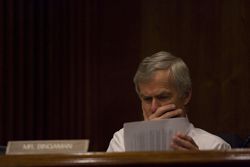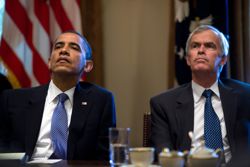The Man Working on a Clean Energy Plan
Air Date: Week of February 4, 2011

Senator Jeff Bingaman of New Mexico. (Photo: Sierra Suris)
Host Bruce Gellerman talks with Democrat Jeff Bingaman, chair of the Senate Energy and Natural Resources Committee. His committee is charged with legislating a path to a “clean energy” future but he’s not convinced that should include nuclear power, “clean” coal, and natural gas.
Transcript
GELLERMAN: Just as defining what’s renewable energy is debatable, so is the question: what’s clean energy? It’s a distinction with a big difference. In his recent State of the Union Address President Obama didn't mention renewable power once - but referred to clean energy no less than 5 times. He wants clean energy to generate 80 percent of the nation’s needs by 2035. The Senate Committee on Energy and Natural Resources will soon hold hearings on the president’s ambitious goal, and its powerful chairman, democrat Jeff Bingaman of New Mexico, thinks that's doable.
BINGAMAN: It is possible. There is a lot of action going on right now for conventional coal fired power plants that are being scheduled for shut-down. And some of that is just happening because of the economics – the price of natural gas is so low – we don’t have a clear path to get from where we are today to where the President wants us to be, but I think it is conceivable we could get there.
GELLERMAN: The President did mention 80 percent of our energy by 2035 from clean energy -
BINGAMAN: That’s correct….
GELLERMAN: But he defines clean energy a little bit differently, it seems, than you do. You had your renewable electricity standard, and you don’t include some of the things the president does - he includes nuclear power and what he calls clean coal.
BINGAMAN: What we proposed in the last congress, and what we were able to vote out of our Energy Committee, was not a clean energy standard, it was a renewable energy standard, and it said that a certain percentage of the power that was sold by utilities had to come from renewable sources. And that did not include nuclear, it did not include coal, even so called ‘clean coal,’ it did not include natural gas.

![]()
President Obama wants Senator Bingaman to help legislate his goal of doubling the country's clean energy production in 25 years. (Photo: Peter Souza, the White House)
![]()
The President mentioned all three of those in his State of the Union speech. But I’m not proposing any of those at this point – what I am hoping we can do is to hear from some experts, to look at both how a renewable electricity standard operates, and then how that same type of system might work in the case of a broader defined clean energy standard like the President referred to.
GELLERMAN: The President in his State of the Union speech did not mention climate change, or greenhouse gasses - were you disappointed?
BINGAMAN: Well, I think that the President was trying to talk about issues that he would like the Congress to try to move forward and take action on, and send him legislation on. It’s pretty clear that we don’t have the votes in this Congress to pass legislation directly limiting greenhouse gasses. We didn't have the votes to do that in the last Congress - at least in the Senate - and with the change in membership with the new Congress, I think it’s pretty clear that we don’t have the votes in this Congress.
GELLERMAN: The President wants to support clean energy, in part by removing subsidies for big oil. That would be a real drop in the bucket - that’s like four billion dollars - that wouldn’t even be a down payment on some of the projects that, I think, you’re suggesting.
BINGAMAN: Uh, you know, I think that the truth is that the first two budgets that he sent to Congress since he’s been President, they also suggested that the various subsidies for the oil and gas industries be removed or eliminated. The Congress did not take him up on that suggestion. I’m doubtful that this current Congress will either. So there’ll be a struggle to figure out how to get the necessary revenue to do what the President is talking about.
GELLERMAN: Just a few years ago, the United States was a net exporter of green energy technologies and about eight billion dollars in the green, I guess you could put it, and now we’re about 14 billion dollars a year in the red in terms of importing green technologies. What can the US do to improve that?
BINGAMAN: Well, we need to do a whole range of things. And we clearly need to adopt policies that create more of a demand for clean energy products in this country. By doing so, we also attract the manufacturing for those products, and then we are in a position to export - so that’s one thing.
We need to provide more financial assistance to clean energy developers - people who are putting in wind farms and photovoltaic arrays around the country so that we can do better there as well. Other countries have just made this a very high priority. China in particular, has invested an enormous amount - is investing each year - an enormous amount in trying to capture this whole sector of industry - this whole clean energy sector.
GELLERMAN: Well, Senator, thank you very much. I really appreciate it.
BINGAMAN: Okay, my pleasure.
GELLERMAN: Democrat Jeff Bingaman is Chair of the Senate Energy and Natural Resources Committee. Right after our conversation he met with President Obama in the White House to discuss energy issues - clean or renewable - we don’t know. Neither the White House nor Senator Bingaman talked to reporters after their meeting.
Links
Click here for a critique of the president's clean energy strategy.
Living on Earth wants to hear from you!
Living on Earth
62 Calef Highway, Suite 212
Lee, NH 03861
Telephone: 617-287-4121
E-mail: comments@loe.org
Newsletter [Click here]
Donate to Living on Earth!
Living on Earth is an independent media program and relies entirely on contributions from listeners and institutions supporting public service. Please donate now to preserve an independent environmental voice.
NewsletterLiving on Earth offers a weekly delivery of the show's rundown to your mailbox. Sign up for our newsletter today!
 Sailors For The Sea: Be the change you want to sea.
Sailors For The Sea: Be the change you want to sea.
 The Grantham Foundation for the Protection of the Environment: Committed to protecting and improving the health of the global environment.
The Grantham Foundation for the Protection of the Environment: Committed to protecting and improving the health of the global environment.
 Contribute to Living on Earth and receive, as our gift to you, an archival print of one of Mark Seth Lender's extraordinary wildlife photographs. Follow the link to see Mark's current collection of photographs.
Contribute to Living on Earth and receive, as our gift to you, an archival print of one of Mark Seth Lender's extraordinary wildlife photographs. Follow the link to see Mark's current collection of photographs.
 Buy a signed copy of Mark Seth Lender's book Smeagull the Seagull & support Living on Earth
Buy a signed copy of Mark Seth Lender's book Smeagull the Seagull & support Living on Earth

